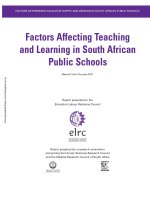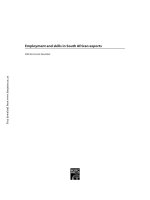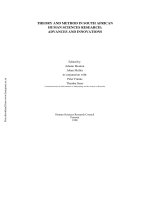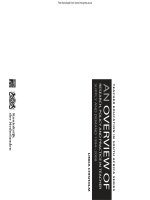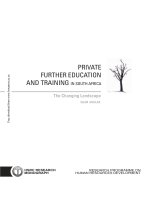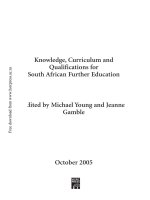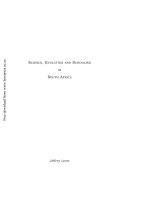Theory and Method in South African Human Sciences Research pot
Bạn đang xem bản rút gọn của tài liệu. Xem và tải ngay bản đầy đủ của tài liệu tại đây (1011.22 KB, 338 trang )
THEORY AND METHOD IN SOUTH AFRICAN
HUMAN SCIENCES RESEARCH:
ADVANCES AND INNOVATIONS
Edited by:
Johann Mouton
Johan Muller
in conjunction with:
Peter Franks
Themba Sono
(Commissioned by the Subcommittee on Methodology and the Analysis of Research)
Human Sciences Research Council
Pretoria
1998
Free download from www.hsrcpress.ac.za
© Human Sciences Research Council, 1998
All rights reserved. No part of this publication may be reproduced or
transmitted in any form or by any means, electronic or mechanical,
including photocopy, recording or any information storage and retrieval
system, without permission in writing from the publisher.
ISBN 0-7969-1864-3
Layout and design: Susan Smith
Cover design: Alta Benadie
HSRC Cataloguing-in-Publication Data
Theory and method in South African human sciences research: advances and
innovations / edited by Johann Mouton [et al.].
p. cm. (HSRC series in methodology: 40)
Includes bibliographies.
ISBN 0-7969-1864-3
1. Social sciences - Research - South Africa. 2. Social sciences - South Africa -
Methodology. I. Mouton, Johann. II. Series.
1998
300.72068-dc21
Published by:
HSRC Publishers
Private Bag X41
Pretoria 0001
Printed by:
HSRC Printers
230 Soutter Street
Pretoria 0002
Free download from www.hsrcpress.ac.za
THEORY AND METHOD IN SOUTH AFRICAN HUMAN SCIENCES RESEARCH:
ADVANCES AND INNOVATIONS
Free download from www.hsrcpress.ac.za
HSRC SERIES IN METHODOLOGY
Series Editor: Johann Mouton
[Incorporating the HSRC Investigation into Research Methodology’s Research
Reports Series (REPORTS) and the HSRC Studies in Research Methodology
(STUDIES)]
Published titles
1 Norva1, A.J. 1984. ’n Teoretiese studie van die metodologie van kruiskulturele houdingsmeting
[Reports No.1]
2. Joubert, Dian. 1986. Waardes: Navorsing, metodologie en teorie [Reports No.2]
3. Mouton, Johann (ed). 1986. Social science, society and power [Reports No.3]
4. Mauer, K.F. & Retief, A.I. (eds) 1987. Psychology in context: Cross-cultural research trends in South
Africa [Reports No.4]
5 Van Straaten, Z. (ed) 1987. Ideological beliefs in the social sciences [Reports No.5]
6 Retief, Alexis. 1988. Method and theory in Cross-cultural psychological assessment [Reports No.6]
7 Kruger, Dreyer. 1988. The problem of interpretation in psychotherapy [Reports No.7]
8 Strauss, D.F.M. 1988. Die grondbegrippe van die sosiologie as wetenskap [Reports No.6]
9 Mouton, J. et al. 1988. Essays in social theorizing [Reports No.9]
10 Mouton, J. 1988. The methodology and philosophy of the social sciences: A selective bibliography of
anthologies [Reports No. 10]
11 Mouton, J. & Marais, H.C. 1985. Metodologie van die geesteswetenskappe: Basiese begrippe [Studies
No.1]
12 Van Huyssteen, J.W.V. 1986. Teologie as kritiese geloofsverantwoording [Studies No.2]
13 Snyman, J.J. & Du Plessis, P.G.W. (reds) 1987. Wetenskapbeelde in die geesteswetenskappe [Studies
No.3]
14 Mouton, J. & Marais, H.C. 1988. Basic concepts in the methodology of the social sciences [Studies
No.4]
15 Mouton, J.; Van Aarde, AG. & Vorster, W.S. (eds) 1988. Paradigms and progress in theology [Studies
No.5]
16 Frost, M.; Vale, P. & Weiner, D. (eds) 1989. International relations: A debate on methodology
17 Nel. P. 1989. Approaches to Soviet politics
18 Mouton, J. & Joubert, D. (eds) 1990. Knowledge and method in the human sciences
19 Venter, F. 1990. Regsnavorsing – aard, doel en metode
20 Erasmus, P. 1991. Antropologiese paradigmas en stedelike navorsing
21 Louw, J. 1990. Professionalizing psychology
22 Van der Walt, J.L. 1992. Fundamentele opvoedkunde en die ontisiteit van opvoeding
23 Burger, C.W. 1991. Praktiese teologie in Suid-Afrika. ’n Ondersoek na die denke oor sekere voorvrae
van die vak
24 Coertzen, P. 1991. Gepas en ordelik
25 Van Veuren, P. 1991. Argumente – Kriteria – Kritiek
26 Van Vuuren, R. 1991. Dialogue beyond polemics
27 Lategan, B.C. (ed.) 1992. The reader and beyond
28 Joubert, Dian. 1992. Reflections on social values
29 Van Niekerk, A 1992. Rasionaliteit en relativisme. Op soek na ’n rasionaliteitsmodel vir die
menswetenskappe
30 Saunders, C. 1992. Writing history. South Africa’s urban past and other essays
31 Snyman, J. (ed.) 1993. Conceptions of social inquiry
32 Rüsen, J. 1993. Studies in metahistory
33 Mouton, J. & Lategan. B.C. 1994. The relevance of theology for the 1990s
34 Deist, F. 1994. Ervaring, rede en metode in skrifuitleg
35 Viljoen, H. (red.) 1995. Metodologie en representasie
36 Snyman. J. (red.) 1995. Wetenskapbeelde in die geesteswetenskappe
37 Stones, C.R. 1996. Qualitative research approaches to psychotherapy process
38 Nel, P. 1996. Persuasion and science: a review and assessment of the rhetoric of inquiry
39 Mouton, J. & Muller, J. 1998. Knowledge, method and the public good
40 Mouton, J, Muller, J., Franks, P. & Sono T. 1998. Theory and method in South African Human
Sciences Research: Advances and innovations.
Free download from www.hsrcpress.ac.za
PREFACE
This publication forms part of a recent programme to assess the state of the
social and human sciences in South Africa. The Analysis of Research in
the Human Sciences programme, as it was known, commenced in 1993
under the auspices of the Human Sciences Research Council. The
programme was concluded in 1995 (Final report entitled "Social
knowledge for societal transformation").
Four main areas of analysis were identified by the steering committee early
on in the programme. These were: issues related to research resources; the
implementation and usefulness of human sciences research; quality of
research; and methodological and epistemological issues.
The subcommittee
1
which was appointed to investigate methodological and
epistemological issues spelt its objectives out in more detail. The following
more specific goals were identified:
To present a historical overview of the emergence and development of
different methodological approaches within South African social
sciences;
To record attitudes towards methodological and epistemological
developments within particular debates;
To address the issue of, and future scope for, interdisciplinary work in
the human and social sciences.
The committee decided to involve as many scholars as possible in this
review. For this reason more than 20 papers were commissioned in 1995.
This book reprints a selection of these commissioned papers. The select
bibliography at the end of the book was compiled by Lesley Powell under
the guidance of Johann Mouton. Its aim is to present an overview of
methodological and epistemological publications by South African authors
over the past three decades. It does not claim to be comprehensive, but
provides sufficient evidence of the broad scope and interests of South
African human scientists in these areas.
Free download from www.hsrcpress.ac.za
The editors hope that this collection will become a useful reference source
for all social scientists who are interested in methodological and
epistemological issues. We believe that it presents an accurate reflection of
the range of work and level of sophistication that South African scholars
have attained in this domain. We must make two points about the editing:
first, some contributions had to be shortened because of constraints of
space; secondly, we have tried throughout not to change peculiarities in
style. The different authors have clearly interpreted their brief quite
differently. We have, unless it seemed to us to be essential, chosen to keep
contributions as much as possible as they were originally written.
Editors: Johann Mouton
Johan Muller
with
Peter Franks and
Themba Sono
Endnotes
1 Peter Franks (Chair), Johann Mouton, Johan Muller and Themba Sono.
Free download from www.hsrcpress.ac.za
CONTENTS
INTRODUCTION
Tracking trends in theory and method: Past and future 1
Johann Mouton and Johan Muller
CHAPTER 1
Economic history/political economy in South Africa: 19
An assessment
William M. Freund
CHAPTER 2
Post-Marxism in South Africa: Some provisional 33
observations
Andreas Bertoldi and Susan van Zyl
CHAPTER 3
Post-colonialism in South African social science 53
Windsor S. Leroke
CHAPTER 4
Afrocentrism in South African social science: What has 67
been done, how useful has it been?
Themba Sono
CHAPTER 5
“Where angels fear to tread”: Feminism in South Africa 85
Annmarie Wolpe
Free download from www.hsrcpress.ac.za
CHAPTER 6
The new rhetoric 105
Philip Nel
CHAPTER 7
Explanatory power and truth: The promise of critical 129
realism in theology
Daniel P. Veldsman
CHAPTER 8
Comparative religious studies 143
David Chidester
CHAPTER 9
Normative theory in international relations 163
Mervyn Frost
CHAPTER 10
Deconstructing and reconstructing South African 183
psychology
Peter du Preez
CHAPTER 11
Cross-cultural measurement in the human sciences 209
N. C. W. Claassen
CHAPTER 12
Action research and participatory research in South Africa 239
Melanie Walker
Free download from www.hsrcpress.ac.za
CHAPTER 13
Programme evaluation: a structured assessment 255
Johann Louw
CHAPTER 14
Organizational survey interventions 269
Peter E. Franks and Allison C. Cassidy
CHAPTER 15
Geographical information systems 289
E.L. Nel and T. Hill
CHAPTER 16
Sampling in heterogeneous populations 307
D.J. Stoker
SELECT BIBLIOGRAPHY 319
Free download from www.hsrcpress.ac.za
Free download from www.hsrcpress.ac.za
1
Introduction
Tracking trends in theory and
method: Past and future
Johann Mouton and Johan Muller
Why is a review of methodological and theoretical developments
and innovations in a discipline or collection of disciplines important
and, perhaps, even useful? We would argue that an interest in
methodology and theorizing in the social sciences is part and parcel
of the intellectual enterprise. The human scientist cannot but reflect
continuously on what he or she is doing, what assumptions and
presuppositions play a role in social inquiry, which theoretical
traditions and paradigms are influential in determining, or at least
influencing, research choices and agendas. Methodological and
theoretical scholarship is essential to research itself because it
represents the critical interest of all inquiry.
It is important, though, to stress that we would not defend a
position according to which methodological and theoretical
reflections are viewed as insulated from the world. Social inquiry is a
social practice, which means that it reflects historical, political, moral
and social interests. This is also true of research methodology and
theory. This is clearly illustrated in many of the contributions
collected here. Methodological developments (and sometimes
innovations) in cross-cultural research and rural sampling (to
mention only two) were, and still are, affected by the cultural
diversity and specific demographics of South African society. But
developments in methodology and theory are not only influenced by
local factors. As we will see, the increasing globalization of social
science means that international developments and trends, such as
Free download from www.hsrcpress.ac.za
2
the rise of post-modernism and the decline of Marxism, have also
affected South African theoretical debates.
Before we discuss in more detail the specific contributions
collected in this anthology, we will distinguish more systematically
between methodological and theoretical reflections. We will also
refer to other contributions in these areas which are not included
here.
Methodology and theory
Methodology is defined as the “logic of social inquiry”.
Methodological reflection refers to any inquiry into the nature and
structure of the process of empirical inquiry. It has become
customary to distinguish between the specific methods and
techniques that are employed in the practice of research, and broader
methodological paradigms or approaches. Whereas “methods” and
“techniques” refer to the actual “tools” used by social scientists, such
as historical, statistical, survey, experimental and case study
methods, “methodology” usually refers to the underlying logic or
principles that are presupposed in the usage of such methods and
techniques. A methodology is a systematic approach to research
which involves a clear preference for certain methods and techniques
within the framework of specific epistemological and ontological
assumptions. This means that the choice for certain methods and
techniques is embedded in assumptions about the nature and aims of
knowledge (epistemological assumptions) and assumptions about the
social world and human nature (ontological assumptions).
It has become customary to distinguish between at least three
main methodological approaches or paradigms in empirical social
inquiry, namely the quantitative, qualitative and participatory/action
approaches. In the light of what was argued above, it should be clear
that differences between these paradigms are not merely at the level
of method and technique, but involve fundamental differences about
Free download from www.hsrcpress.ac.za
3
the aim of social research, what constitutes valid knowledge, which
features of the social world can be investigated, and so on. We will
return to this distinction further on.
The notion of “theoretical reflection” is equally complex. Various
distinctions are possible, but we believe that it is important at least to
distinguish between “substantive theories” and “social theory”.
Substantive theories would include all those hypotheses and
explanatory frameworks that are offered to account for phenomena in
the human world. Such theories range in scope from very specific
micro-theories to middle-range theories to rather “grand” theories,
such as those of Parsons and Freud. What they all have in common is
an intention to explain some aspect of human behaviour. “Social
theory” refers to a more general, philosophical reflection on the
nature of human nature and society. Tony Giddens describes it in the
following terms:
Social theory’ in my view, spans social science. It is a body of
theory shared in common by all disciplines concerned with the
behaviour of human beings. It concerns not only sociology,
therefore, but also anthropology, economics, politics, human
geography, psychology - the whole range of the social
sciences. Neither is social readily separable from questions of
interest to an even wider set of concerns: it connects through
to literary criticism on the one hand and to the philosophy of
the natural sciences on the other. (Giddens, 1982:5-6).
Even this distinction does not uniquely denote what everyone
would count as “social theorizing”. Some social theory, such as
Marxism and phenomenology, is fairly close to grand substantive
theories. Other forms of social theory, such as post-modernism,
critical realism and critical theory, are perhaps closer to
philosophical analyses. We believe it is impossible to make these
distinctions less fuzzy and would hope that the reader finds the
contributions that are included under this heading to be somewhat
self-explanatory.
Free download from www.hsrcpress.ac.za
4
Social theory and South African scholarship
To say that theory in the social sciences diverges rather than
converges is a commonplace. Unlike the natural sciences, where
knowledge structures are broadly pyramidical and where knowledge
growth is vertical and consequently widely acknowledged by the
scholarly community, the social sciences are characterized by
horizontal clusters of self-enclosed communities of discourse which
rarely communicate with each other, much less acknowledge each
others’ existence, even though they manifestly share the same objects
of study (Bernstein, 1996). There may be modest vertical knowledge
growth within each cluster, but the social sciences seem, perhaps for
the meantime only, collectively to have given up the effort of driving
towards a general theory of society and social behaviour,
notwithstanding the continuing efforts of such highly respected
writers as Habermas and Giddens. Theoretical disputes are now
resolved simply by founding a new paradigm or sub-school.
Much of this pluralism which is characteristic of social science
globally is the result of successive waves of disputes which were
never definitively concluded: the ‘positivismusstreit’ in Germany, for
example, and the convulsive debates triggered off by the structuralist
and post-structuralist challenges concerning the linguistic structure of
the social world. Most recently, the post-modern celebration of
difference, diversity and particularity, and its distaste for the very
attempt at over-arching explanation has provided justification, as if it
were needed, for irretrievable pluralization.
Pluralism may be seen as a sign of health and vigour, as the post-
modernists see it, or as a function of fragmentation and disciplinary
weakness, as the modernists of both left and right do. The fact of the
matter is that both dynamics are discernibly at play, and the
pluralized state of South African social theory is the result of forces
that are both global as well as quite particular to our own history.
Free download from www.hsrcpress.ac.za
5
There are three main forces that will continue to leave their mark
on social theory and social theorising in South Africa. These are
apartheid, globalization, and the special requirements of critical
reconstruction. These will each be discussed briefly.
Apartheid split the social science community in South Africa, as it
did the political community, into antagonistic camps of friends and
foes. The general logic of schism was of course between those who
were pro-apartheid and those who were anti-apartheid, those for “the
state” and those for “the people”. But these camps were never
homogeneous, especially not the anti-apartheid camp, and
methodological as well as theoretical disputes split the “liberals” and
the “neo-Marxists” on a great number of issues: for example, on the
proper explanatory logic of apartheid (race or class); and on
empirical methods – an entire generation of social science students at
the English-speaking liberal universities were taught to equate
empiricism with statism of all kinds and, in some cases, with
apartheid. The hyper-politicized environment was undoubtedly to
blame, but professional associations (like the national sociology and
psychology associations) split in two, and it is only quite recently
that anything like a national conversation has begun again in some of
the disciplines. In some, like education, the sub-communities remain
largely cloistered in their apartheid-designated isolation.
The very establishment of the so-called “black” campuses has left
its mark on the research and scholarly activity at these institutions,
and these remain poor in proven skills and capacities, and in
productive research traditions. There are encouraging signs that this
is beginning to change, and five years after the end of apartheid the
pattern of inequalities is no longer as homogeneous as it was. Some
of the historically black campuses are beginning to show a research
productivity that has overtaken the rate of productivity at a number
of historically white campuses (see Analysis of Research in the
Human Sciences (ARHS), 1995). In particular, the proportion of
South Africa’s contribution to total world output of social science, as
Free download from www.hsrcpress.ac.za
6
measured by science citation indices, overtook the natural science
proportion in 1993. After years of isolation, South African social
scientists are writing and publishing more than they ever have before.
This is particularly marked in history and historiography.
South Africa has rejoined the global community in more ways
than one. In the first place, our tertiary education sector is showing
all the signs of the massification that tertiary systems worldwide
undergo: escalating enrolments, the push towards greater numbers of
students in postgraduate courses, and the consequent vastly increased
production of graduate and postgraduate qualifications. This has
stimulated scholarly traditions at some universities, though not yet at
all. But the need for competent postgraduate training in research
methodology is more evident now than it was before.
There is a vastly-increased two-way traffic of scholars: South
Africans are going overseas, and going north, in far greater numbers
and more often than before, and international scholars are visiting in
droves. There are few national conferences now without a generous
sprinkling of foreigners.
This recent detente with the global scholarly community has not
been consistent or even. In the dark days of apartheid, the best South
African scholars managed to keep selective lines of contact with
certain, often quite arbitrary, groups of scholars and scholarly
traditions internationally. The Duquesne school of phenomenological
psychology, for example, is well represented in this country, but
none of the other phenomenological traditions outside of the peculiar
version that has come to be called fundamental pedagogics has made
any impact here. Ethnomethodology, for example, seems to be quite
unknown.
This pattern of individual South African scholars identifying with
external “communities of discourse” has intensified. One unfortunate
effect is that many scholars participate more readily and productively
in global scholarly communities, at the expense of building strong
Free download from www.hsrcpress.ac.za
7
and enduring communities, or indigenous paradigms, at home.
The global pull has thus been something of a mixed blessing. On
the one hand, international debates, often cast in the same terms as
they would be elsewhere, are fought out with the same ferocity here
as elsewhere. The debate within the feminist community around the
privileging of “experience” is as heated an issue here (see Wolpe,
this volume) as it is in the USA (Scott, 1995). On the other hand,
what we also see is a proliferation of mini-traditions, sometimes with
one researcher, or at most a small number, being the only national
representative of the mini-tradition. This trend too is reflected in this
volume (for example Frost and Franks).
The demands of critical reconstruction add a third element to the
mix of forces towards pluralization or fragmentation, this one
arguably more unambiguously positive. The reconstructive
challenges of the RDP have spawned a great demand for new kinds
of knowledge and new kinds of research. Some of this work is
recognizably basic or applied research of the familiar kind. But some
of it requires new kinds of participation and involvement, new kinds
of research skills, new forms of organizing the research (Bawa,
1995). Along with these new forms of knowledge production will
come new criteria for evaluating the adequacy of the knowledge; and
along with that will come new debates around the nature, validity
and scope of social knowledge. Which is as it should be.
The debates represented here should then come as no great
surprise. The reader will find chapters on feminism, post-
colonialism, post-marxism and the new rhetoric. None of these has
emerged in dramatically different or idiosyncratic ways in South
Africa. All of them are as much part of global scholarship as they are
of national scholarship.
What these chapters offer, therefore, is access not only to South
African theory and scholarship, but to the world of theoretical
innovation. There are very useful introductions here to the major
debates in feminism, post-Marxism and post-colonialism, as well as
Free download from www.hsrcpress.ac.za
8
to the intricacies and subtleties within the emergent orthodoxy of the
social construction of knowledge. These domains are, therefore,
simultaneously local and global.
There are also a number of singular features of these chapters, two
of which deserve special mention. The first is that they all display a
particular reflexivity, or awareness, verging at times on self-critique,
regarding the theoretical orthodoxies of the past and, in particular,
the theoretical trends that propelled the anti-apartheid movement
towards political liberation. Leroke, for example, boldly defines post-
colonialism as an attempt to look for a basis for theoretical moorings
beyond Marxism, which was, in a variety of different forms, the
prevailing liberation movement orthodoxy. Hudson, whose work
Bertoldi and Van Zyl examine in some detail here, puts his finger on
a series of problematic concepts – like “experience” and “ideology”
which have in his view flawed the political writings of the liberation
movement as well as some of their founding documents, like the
Freedom Charter. Wolpe, from a position far more sympathetic to
orthodox Marxism than either Leroke or Hudson, emphasizes like
Hudson the theoretical weakness of the privileging of “experience”
as an explanatory notion, as well as some of its disabling political
consequences. Even Sono, in a largely sympathetic review of
Afrocentrism, concludes by wondering just how useful such a
paradigm may end up being in our particular circumstances.
If these chapters are marked by their sensitivity to the historical
context, they are, equally, marked by attention to global debates. In
particular, nearly all of them position themselves with respect to the
constellation of post-modernism and the various challenges it poses
for theory. Nel, for instance, shows with considerable nuance how
the new rhetoric is a methodological sophisticate that grows from the
post-modernist turnaway from foundationalism, and concludes by
warning against the over-inclusive ambitions of an approach that,
like its larger parent post-modernism, quickly becomes a clarion call
to subjectivism in the hands of the over-eager. Leroke is quite happy
to align post-colonialism with post-modernism, and to oppose both to
Marxists of every stripe.
Free download from www.hsrcpress.ac.za
9
Bertoldi and Van Zyl, with Hudson, implicitly distinguish
between post-structuralism and post-modernism, and indeed their
critique of “experience” as an organizing notion begins to display
some of the problems that post-modernism’s subjectivism poses for
theory and politics. Wolpe makes the same point against the post-
modernist feminists who, ironically in the case of feminism, claim
the mantle of heirs of the liberation struggle. Each of these
reflexivities thus locates South African theoretical scholarship in its
simultaneously local and global position.
One of the interesting features of the South African intellectual
scene is the fact that it has strong links both with the Anglo-
American and continental traditions. Although it was traditionally the
case that the analytic tradition was better represented at the English
liberal universities and, conversely, that the continental traditions
(especially German and Dutch) were more influential at the
Afrikaans-medium universities, this situation is certainly changing.
For example:
The hermeneutic paradigm (Gadamer, Betti and Ricoeur) has
had a significant influence not only in traditional Biblical
scholarship (vide the work of Vorster, Lategan, Combrink), but
also in communication studies (see De Beer: 1993).
Traditional critical theory (Habermas) has been influential in
psychology, education, communication studies and legal studies.
In the eighties, neo-Marxist thinking, in the form of Althusser
and Gramsci, became prominent in sociology, history and
education (see Bertoldi and Van Zyl in this volume).
Critical rationalism (Popper) has had its followers, most notably
in economic theory as well as in theology (Maree).
Scientific realism (Bhaskar, Harre, Secord, Outhwaite) has
influenced the work of psychologists (Craig, 1990, 1992, Miller,
Retief, 1988a, 1988b). More surprisingly, perhaps, it has also
had a major impact on debates in systematic theology through
the path-breaking book of Van Huyssteen (1986); see also
Veldsman, 1995.
Free download from www.hsrcpress.ac.za
10
Other examples would have to include the impact of reception
theory in many disciplines (see Lategan, 1992), the recent
influence of post-modernism and related traditions like post-
colonialism and post-structuralism. For these, see Bertoldi and
Van Zyl, Leroke, and Sono, all in this volume.
This list – which does not claim to be comprehensive – also does
not include the work of local philosophers of social science. Some of
the more noteworthy publications cover topics such as ideology and
social inquiry (Jansen, 1991; Mouton, 1986; Van Straaten, 1987);
debates about objectivity, rationality and relativism (Van Niekerk,
1992); the nature of social theorizing (Botha, 1987; Mouton et al.,
1988) and the plurality of epistemological traditions (Mouton &
Joubert, 1990; Snyman, 1993).
This selection of epistemological work gives an indication of the
range of interests in the field. More importantly, perhaps, many of
the authors mentioned have published internationally as well. The
impact locally has been to create a healthy interest in meta-
theoretical discourse in many disciplines. In fact, some
commentators might argue that there is too much emphasis in South
African academic circles on meta-theoretical and epistemological
debates and too little attention to technical-methodological issues.
Although there is certainly some truth in this observation, an interest
in meta-reflection in social science can only be of benefit to
practising researchers. At least it provides some buffer against a
wholesale degeneration into technicism.
In conclusion: despite the effects of the academic boycott,
censorship (see Merret, ) and geographical isolation, South African
scholars have, albeit selectively, been able to remain up to date with
debates in the northern hemisphere in epistemology and social
theory. Again, despite the academic boycott, many South African
scholars were able to retain some links with international networks. It
is unfortunately also true that, despite this extensive interest in and
engagement with international debates, no South African scholar has
made a significant original contribution to social theory. Whether
Free download from www.hsrcpress.ac.za
11
this is a legitimate criticism remains a matter of debate. It is more
than likely that the issue of whether South African social theorists
should continue their global concerns or attempt to become more
Afrocentric and relevant to local concerns, will only intensify. In
fact, some of the current attractions of post-modern social theory are
exactly to be found in its insistence that social theory should be
culturally sensitive and historically specific. Where such a
celebration of particularity leaves the growth of knowledge remains
to be seen.
Quantitative, qualitative and participatory approaches
in South African social science
There is a long tradition of quantitative social research in South
Africa. Two areas are worth specific mention: survey research
(which would include a strong market research tradition) and
psychometric testing.
Surveys are by nature predominantly descriptive. Their strength is
that they provide broad and general pictures of the social world.
Survey data are useful when one wishes to discover what the state of
affairs is, how people think about certain matters, what their basic
needs are, and so on. Opinion polling, attitudinal surveys, advertising
studies and market segmentation studies, and political monitoring are
all examples of the application of the survey method. All of these
studies are well represented in South Africa. The Human Sciences
Research Council, as well as institutions such as the Institute for
Democratic Alternatives in South Africa, the Institute for Multi-Party
Democracy, university-based centres such as the South African
Labour and Development Research Unit (UCT), the Centre for
Social and Development Studies (UN), and the Institute for Social
and Economic Research (UDW), research NGO’s (such as the
Community Agency for Social Enquiry) and the market research
sector (for example Market Research Africa, Markinor, Research
Surveys) regularly conduct large national surveys (see Corder, 1995;
Free download from www.hsrcpress.ac.za
12
Franks (this volume); Mouton, 1995 and Stoker (this volume)).
Psychometric testing has an equally long tradition (Du Preez, this
volume) in South Africa dating back to the establishment of the
National Institute for Personnel Research in 1994. The development
of tests for industry and educational applications has become a huge
industry.
The “investment” in quantitative research, as embodied in these
traditions, has resulted in pockets of methodological expertise. We
have included four chapters in the book that address these, namely
issues in sampling (Stoker), psychological testing and cross-cultural
measurement (Du Preez and Claassen) and geographical information
systems (Nel and Hill).
It is not surprising that South African scholars have paid so much
attention to the methodological issues involved in sampling, given
the particular demographic profile of the country and problems
involved in sampling rural areas and informal settlements. Similarly,
the interest in cross-cultural studies does not require justification. At
the same time, there are a number of areas which have not received
sufficient attention. Two are worth commenting on: the lack of
secondary data analysis and the lack of a strong tradition in
comparative research.
Two reasons may be offered for the lack of a strong tradition in
secondary data analysis in South African social science. First, one
would have to say that there is a general lack of access to large data
sets, both because of problems in gaining access (until recently) to
such data; secondly, because of a lack of overseas data sets being
made available locally. The establishment of the South African Data
Archive (accessible at www.hsrc.sada) in 1993 should go a long way
to rectifying this situation.
There is also no strong history of comparative and cross-national
quantitative studies in South African social science. With some
exceptions, few South African researchers have undertaken large
cross-national studies. The small number of exceptions would
Free download from www.hsrcpress.ac.za
13
include the work of Lawrence Schlemmer, Amanda Gouws, Hennie
Kotze, Johan Olivier, Francis Wilson and others. Financial
constraints (such surveys are quite expensive) as well as the lack of
international contact (exacerbated by the academic boycott), could be
cited as causes for this state of affairs. With the increasing
normalization of our international research networks, there is a
growing interest by overseas scholars in collaborating with local
scholars. This should provide the long-needed impetus for more
comparative studies, with a concomitant increase in interest in the
analysis of large data sets and secondary data-analysis.
Qualitative studies
Traditional qualitative research approaches, such as ethnographic
studies, participant observation, in-depth interviewing methods and
the use of documentary sources, have a long tradition especially in
anthropological and historical studies in South Africa. The names of
Wilson, Kuper, Radcliffe-Brown, Hammond-Tooke and more
recently Preston-Whyte, Boonzaaier, Sharp, Kotze, Gordon, and
Thornton attest to a proud tradition in social anthropology. Similarly,
numerous excellent studies in oral history and related disciplines
have appeared (see Bozzoli, 1990b for a review). The linkage
between people’s history and local historical studies (as embodied in
the History Workshop at Wits) is another example (see Bozzoli,
1992).
Outside of anthropology and history, one finds more isolated
instances of qualitative empirical studies. Some examples are the
following:
In psychology, a significant non-positivist tradition is the local
phenomenological school. The work of Dreyer Kruger (see
Kruger, 1988), now being taken further by people such as Van
Vuuren (1991) and Stones (in press), continue the Duquesne
tradition in the USA (Giorgi) based on the European
phenomenology of Husserl and Van den Bergh.
There is interest in discourse analysis as exemplified in the work
Free download from www.hsrcpress.ac.za
14
of Levett (1990) and Kottler (1990). As far as the field of
communication and media studies is concerned, other more
qualitative work would include De Beer (1993) in journalistic
studies, Tomaselli’s work in semiotic analyses, and the work of
the Department of Communication Studies at UNISA (see
Jansen, 1989), exemplifying the existential phenomenology of
Kierkegaard.
Empirical qualitative research in sociology is somewhat more
incidental. It is worth referring, though, to the sustained wide-
ranging work of Willem and Evanthe Schurink (Schurink &
Schurink, 1988) and Ferreira (1990) at the HSRC.
At the “institutional” level it is worth referring to three research
centres with a pronounced emphasis on qualitative research. The
HSRC’s Centre for Research Methodology, headed by Ineke
Meulenburg-Buskens, a structural anthropologist in the Levi-
Strauss mode, focuses most of its training and consultancy on
qualitative research. In the market research world, the Qualitative
Consultancy, until recently headed by Jean Green, has
established a proud tradition in qualitative market research. The
research organization, Ark Research, which was recently taken
over by Cathy Payze, not only provides training in qualitative
research methods, but has a specific focus on training in
computer packages for qualitative data analysis (such as Atlas Ti,
Nud*ist and Ethnograph). Training in Kwalitan is provided by
Cenmet. These developments are only to be welcomed given the
general lack of experience in computerized qualitative data
analysis.
As an overall assessment, one must conclude that there is a long
tradition of qualitative research in South Africa, especially in such
disciplines as anthropology and history. Its institutionalization at
South African universities in such departments as sociology,
psychology and education has, however, not been widespread. It is
also interesting to note that there has been no real antagonism, at
least not recently, between proponents of qualitative and quantitative
approaches in South Africa, certainly not as is evident in many
Free download from www.hsrcpress.ac.za
15
American universities. There have been a number of recent articles
on the qualitative-quantitative issue (see Lotter, 1995, Mouton,
1983a, 1985; Schurink & Schurink, 1988) – all of which have been
conciliatory and constructive in tone. On the downside, one has to
admit that systematic training in qualitative research is still the
exception rather than the rule. This is probably due both to the lack
of suitably qualified and experienced researchers, as well as to the
lack of appropriate facilities for training (such as closed circuit
television observation rooms, the availability of computer packages
and so on).
Participatory/ action research
Some form of participatory research has always been a feature of
most traditional anthropological research. However, it is really since
the sixties and early seventies that participatory action research, as a
methodological approach with a critical and emancipatory interest,
became popular (see Mouton, 1988 for a discussion). Its impact on
South Africa has been felt primarily in educational and psychological
research.
As far as educational research is concerned, the action research
paradigm grew out of the people’s education movement in the mid-
eighties (see Davidoff, 1993). Much of this work was grafted onto a
humanistic neo-marxist or critical theory tradition (Carr and
Kemmis). The research interest in this kind of research is primarily
practical, and only secondarily cognitive. Perhaps this is why there
has been so little of this work published in the conventional research
journals. Related to these developments was a growing interest in
naturalistic and fourth generation educational evaluation studies
(Guba and Lincoln) (see Louw, this book, for an overview). The visit
to South Africa in 1993 of one of the foremost proponents of
“empowerment evaluation” in the USA, David Fetterman (Stanford),
lent further impetus to the popularity of this approach.
The increased interest in and influence of participatory research
approaches in the late eighties and early nineties was clearly linked
Free download from www.hsrcpress.ac.za


